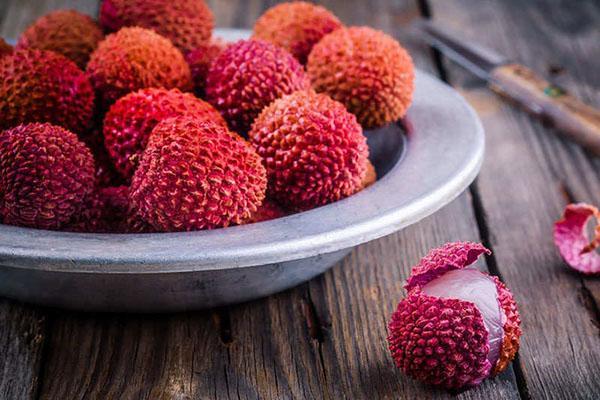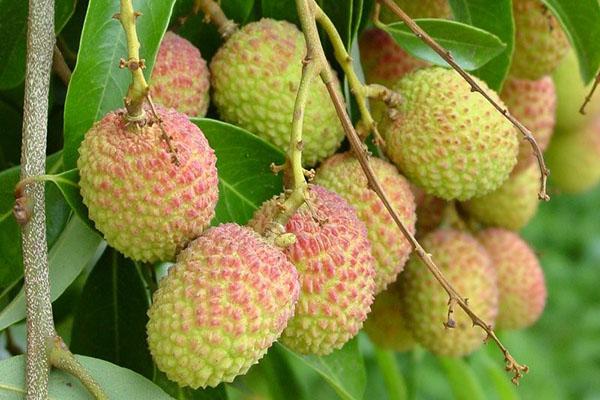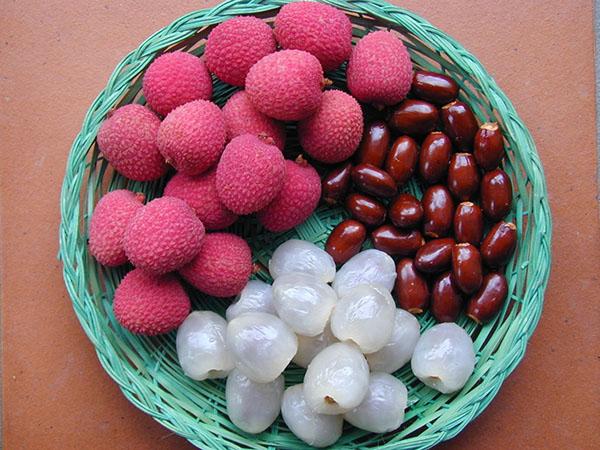The benefits of lychee and other features of an exotic fruit
 The first written description of these tropical fruits dates back to the second century BC. The exquisite taste and benefits of lychee attracted the attention of the Chinese emperor Wu Di. The formidable ruler, who had practically doubled the country's territory, really wanted to become immortal. The reddish fruit with juicy pulp and dense skin invigorated you, instantly quenching your thirst and hunger. Perhaps they would have become one of the ingredients of a wonderful elixir, but the court gardeners did not manage to grow a capricious tree in the north of the Middle Kingdom.
The first written description of these tropical fruits dates back to the second century BC. The exquisite taste and benefits of lychee attracted the attention of the Chinese emperor Wu Di. The formidable ruler, who had practically doubled the country's territory, really wanted to become immortal. The reddish fruit with juicy pulp and dense skin invigorated you, instantly quenching your thirst and hunger. Perhaps they would have become one of the ingredients of a wonderful elixir, but the court gardeners did not manage to grow a capricious tree in the north of the Middle Kingdom.
In Europe, about two thousand years later, they learned about the amazing fruits, called not lychees, but the Chinese plum. The Russians got acquainted with delicious exoticism quite recently, but have already managed to appreciate its merits.
What is lychee

When cut open, the fruit looks like a dragon's eye with a brown shiny pupil.
Ripe fruits, easily peeled off, have a very pleasant taste and aroma. If you do not know what lychee is, the fruit will involuntarily remind grapes or fragrant meadow strawberries.
The composition and calorie content of lychee
 Lychee is a generous source of nutrients and vitamins. Ripe fruits accumulate up to 15.2% of sugars. Therefore, to the question: "What does lychee taste like?", You can give only one answer. The sweet, slightly crispy flesh will appeal to any gourmet. Moisture gives the fruit refreshing juiciness, which accounts for up to 82.5%. In addition, the fruit contains dietary fiber, vitamins and minerals.
Lychee is a generous source of nutrients and vitamins. Ripe fruits accumulate up to 15.2% of sugars. Therefore, to the question: "What does lychee taste like?", You can give only one answer. The sweet, slightly crispy flesh will appeal to any gourmet. Moisture gives the fruit refreshing juiciness, which accounts for up to 82.5%. In addition, the fruit contains dietary fiber, vitamins and minerals.
The leading position among the essential vitamins is occupied by ascorbic acid. This is followed by vitamins of group B, E, K and PP. The list of micro and macro elements combines potassium and phosphorus, copper, sodium, magnesium, iron, calcium and other compounds.
Fruit desserts are prepared on the basis of sweet pulp, added to ice cream and other delicacies. At the same time, the calorie content of lychee is only 70 kcal per 100 grams of fruit.
Lychee - a source of vitamins and antioxidants
 Lychee contains B vitamins, which include thiamine, riboflavin, niacin and folate. These substances help the body absorb carbohydrates, proteins and fats. Due to the high concentration of beta-carotene, lychee strengthens the immune system, improves the functioning of the liver and other organs.
Lychee contains B vitamins, which include thiamine, riboflavin, niacin and folate. These substances help the body absorb carbohydrates, proteins and fats. Due to the high concentration of beta-carotene, lychee strengthens the immune system, improves the functioning of the liver and other organs.
Official medicine has confirmed the benefits of lychee for obsessive dry cough. A handful of small fruits normalizes blood sugar levels, which is extremely important in diabetes.
Lychee fruits contain oligonol, which has powerful antioxidant properties. The unique complex improves blood circulation, increases body endurance, and protects the skin from harmful UVA rays.
Including lychee in your diet allows you to:
- reduce the risk of cardiovascular disease, cancer, Alzheimer's and Parkinson's;
- effectively reduce weight;
- slow down aging;
- reduce the depth of wrinkles;
- prevent the appearance of age spots.
For the body to get its daily intake of vitamin C, you need to eat only 150 grams of fresh fruit.
Ascorbic acid, indispensable for humans, increases the body's resistance to infectious diseases, protects against harmful free radicals, and improves skin condition.
The health benefits of lychee
 In China and Vietnam, the benefits and harms of lychee fruit have been well studied by traditional medicine. The fruits, referred to as “a gift for a long life,” contain many nutrients and vitamins that help fight various diseases, care for hair and skin, strengthen the body of children and resist aging.
In China and Vietnam, the benefits and harms of lychee fruit have been well studied by traditional medicine. The fruits, referred to as “a gift for a long life,” contain many nutrients and vitamins that help fight various diseases, care for hair and skin, strengthen the body of children and resist aging.
The benefits of lychee in the fight against cancer
The flavones quercitin and kaempferol contained in the pulp help fight deadly cancer, resist the multiplication and spread of cancer cells.
The effectiveness of the fetus has been proven in the complex treatment and prevention of breast cancer.
Diseases of the heart and blood vessels
 Lychee normalizes blood pressure and heart rate, thereby protecting against strokes and coronary artery disease. Thanks to the polyphenols and antioxidants contained in the pulp, 1 cup of lychee juice normalizes the heart rate daily. Lychee benefits from a high concentration of potassium necessary for the heart.
Lychee normalizes blood pressure and heart rate, thereby protecting against strokes and coronary artery disease. Thanks to the polyphenols and antioxidants contained in the pulp, 1 cup of lychee juice normalizes the heart rate daily. Lychee benefits from a high concentration of potassium necessary for the heart.
Sweet fruits included in the menu increase immunity and block the development of cardiovascular diseases. Lychees are rich in polyphenols and rutin, a bioflavonoid that strengthens blood vessels, indispensable in the treatment of hemorrhoids and varicose veins.
Bioactive substances, including copper, vitamin C, iron, folate, manganese and magnesium, are important for proper blood circulation. Regular consumption of the fruit helps to increase the number of red blood cells and prevent anemia.
Lychee for digestive health
 Lychee maintains the tone of the digestive system, helps cleanse the body, improves appetite, eliminates heartburn and a feeling of heaviness in the stomach. The pulp of the fruit is rich in soluble fiber, which regulates the intestines, prevents the accumulation of toxins and toxins.
Lychee maintains the tone of the digestive system, helps cleanse the body, improves appetite, eliminates heartburn and a feeling of heaviness in the stomach. The pulp of the fruit is rich in soluble fiber, which regulates the intestines, prevents the accumulation of toxins and toxins.
There is a misconception that the lychee bone is edible. This is not true! Fresh semen contains toxins that can cause hypoglycemia.
However, dried seeds, which have astringent properties, are used in preparations to combat helminthiases.
Lychee to strengthen bones
Lychee is a rich source of phosphorus and magnesium, copper and manganese. These elements support the health of the skeletal system, strengthen it. Together with zinc, copper stimulates the production of vitamin D, increases the absorption of calcium.
The benefits of lychee for beauty of hair and skin
 Lychees protect the body from oxidative stress caused by environmental pollution and ultraviolet radiation.
Lychees protect the body from oxidative stress caused by environmental pollution and ultraviolet radiation.
Eating lychee or using it in facial cosmetics can help fight skin aging, wrinkle formation and discoloration.
Lychee fruits for skin benefits:
- supply her with nutrients;
- help to digest fats and proteins;
- increase the level of moisture in the tissues;
- accelerate healing.
Fruits with sweet pulp and high vitamin content are equally beneficial to hair. They activate microcirculation, nourish and strengthen hair follicles.
How to eat lychee, choose and save fruit
 Lychees cannot ripen during transportation and storage, so in the store you need to choose the best, ripe fruits with bright pink-red skin without spots. It is important that the lychee skin that retains its beneficial properties is tough and elastic. Do not eat fruit with traces of mold, damage, signs of fermentation and darkened pulp.
Lychees cannot ripen during transportation and storage, so in the store you need to choose the best, ripe fruits with bright pink-red skin without spots. It is important that the lychee skin that retains its beneficial properties is tough and elastic. Do not eat fruit with traces of mold, damage, signs of fermentation and darkened pulp.
Before eating lychees, the fruits should be washed thoroughly. Then you need:
- cut or tear the skin at the top;
- remove the hard inedible coating;
- remove the seed.
Peeled fruits should be eaten immediately. Peeled lychees can be stored at room temperature for up to 5 days or in the refrigerator for no more than one and a half months.To avoid moisture loss and spoilage, the fruit should be wrapped in a paper towel and placed in a perforated plastic bag.